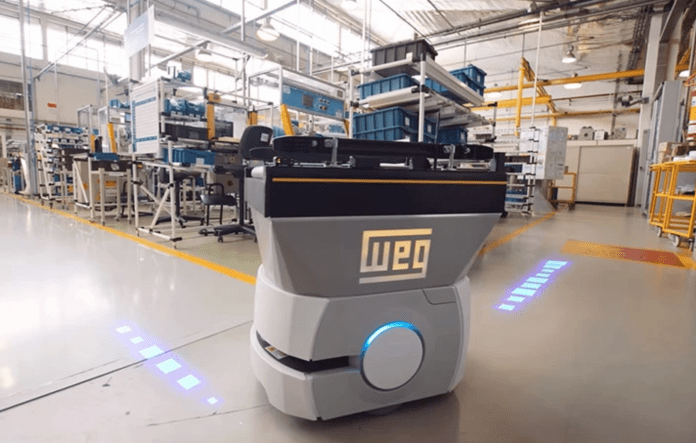Brazilian electronic equipment manufacturer WEG is working with the Brazilian National Telecommunications Agency (Anatel) and Finnish network vendor Nokia on parallel Industry 4.0 testbeds using public and private 5G networks in a live factory setting in Jaraguá do Sul, in the Brazilian state of Santa Catarina.
The year-long Open Lab WEG/V2COM project is being coordinated with the Brazilian Agency for Industrial Development (ABDI), as well as Anatel, with a view to ‘stand-up’ the case for 5G-enabled Industry 4.0 in the country. The factory in Jaraguá do Sul is already billed as “one of the most automated, robotic factories”, said WEG, with high levels of automation and monitoring of the shop floor.
WEG is managing the project with São Paulo based IoT provider V2COM, which it acquired in late 2019. number of “practical and advanced” Industry 4.0 use cases will be developed. The results will be combined with other independent studies being carried out by Anatel, which is examining business use cases for 5G private wireless.
Nokia is supplying its Digital Automation Cloud (DAC) platform for the standalone (SA) private 5G setup. There is some confusion in parallel releases about the operator-led element; Nokia said Anatel is running 5G as a “conventional mobile operator”, while WEG called it a “private network via [an] operator”. WEG said the architecture will be different in each case, with one “conventional and the other virtualized”.
The project will evaluate performance and coexistence of 5G-based industrial devices and antennas, to gather data on frequency ranges, latency, power, and other industrial networking characteristics. Nokia said two radio frequencies will be evaluated: one below 6 GHz and another between 27.5 GHz and 27.9 GHz. An independent research institute will analyze the performance of each.
Carlos Bastos Grillo, director of digital business at WEG, said: “We are making available our best structure for carrying out the tests… to generate consistent data about the economic viability and balance point in the transition to 5G, as well as allow WEG to test and validate the performance of products and software in this new connectivity environment. Even though the project is carried out in a factory environment, the benefits generated are not limited to the specific industry, as such applications are widely used in the most varied practices.”
Guilherme Spina, director of V2COM, said: “It will be possible to test more than one 5G network in the same location, initially with a private network via operator and another with local infrastructure. We will have different network architecture implementations, one conventional and the other virtualized, we will also test antennas and 5G devices by millimeter waves as well as sub 6 GHz.”
Marcelo Entreconti, head of enterprise for Nokia in Latin America, said: “This project with WEG is the latest example of Nokia’s use of 5G private wireless to implement Industry 4.0 in Brazil through our role as a leading supplier and technology partner. Through our technology, we are bringing increased productivity to a myriad of sectors in the critical post-pandemic landscape, and we are committed to meet various industry demands, including high-quality training of personnel, our project with OpenLab Senai, and use cases such as those being tested and applied by WEG.”

